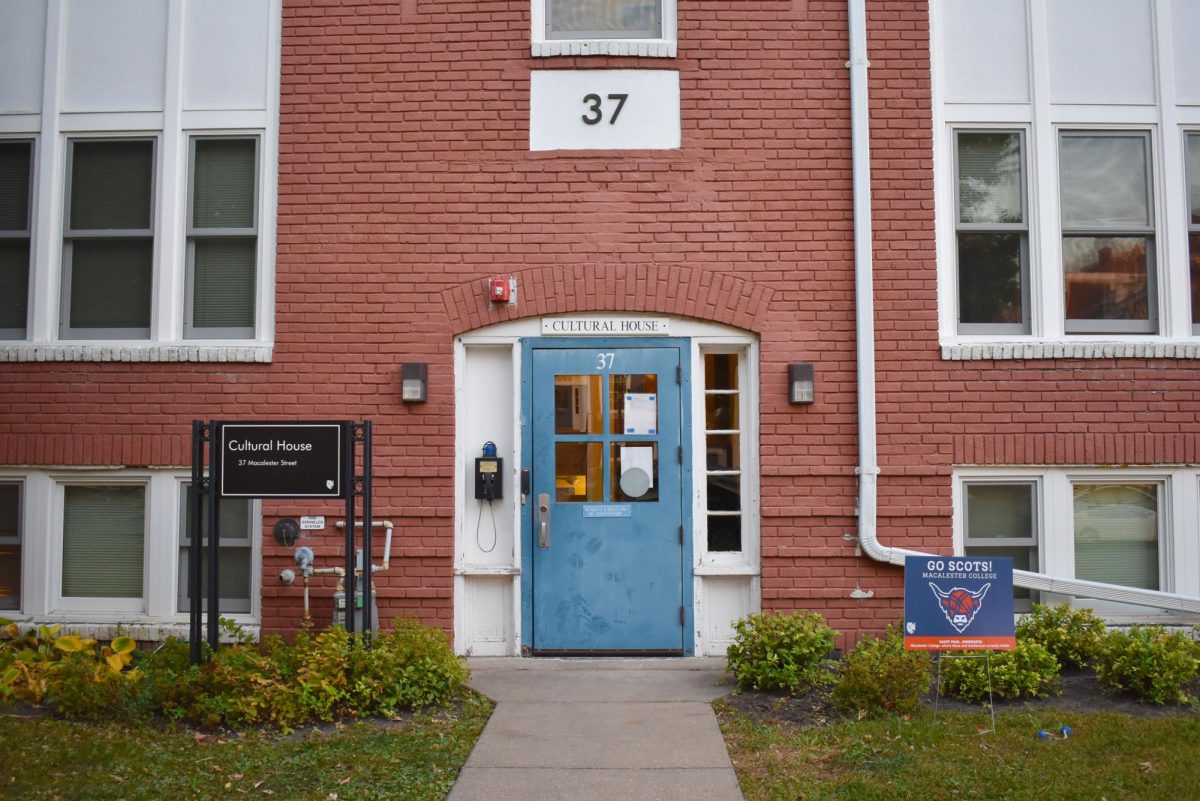On Sept. 26, students received an email from Vice President for Student Affairs Kathryn Kay Coquemont sharing two potential temporary locations for the Cultural House (C-House): Grand Cambridge Apartments (GCA) and Summit House. This update comes as Macalester plans to demolish the Cultural House, part of the Comprehensive Campus Plan (CCP). Replacing the C-House structure will be a new residence hall and welcome center on the northwest corner of Macalester Street and Grand Avenue.
Zayna Hopkins ’27 lived in the C-House and found fellowship alongside her classmates in the first-year course (FYC) ‘We Demand! Student Power, World Building, and Democratizing Higher Education.’
“I didn’t really know anyone coming to Macalester,” Hopkins said. “Everyone is completely new, all the places are new, all the people are new … The C-House gave me a constant community and people to come back to.”
Yamalí Rodas Figueroa ’27 also lived in the C-House as a part of that FYC. They were drawn to the C-House because of its history of student activism.
“[The Cultural House is] where students can have real conversations about issues that are happening,” Rodas Figueroa said.
Additionally, the C-House is an important space for students like Rodas Figueroa to gather.
“It’s a place that helps sustain students with marginalized identities,” Rodas Figueroa said.
“The C-House is an incredibly beautiful space for anyone to come to and have this collaborative experience of joy, of discussion, of learning, that you don’t really experience in any other space at Macalester,” Sanya Bains ’25, a program assistant at the Lealtad-Suzuki Center for Social Justice (LSC), said.
Because of a desire for community, GCA, located in the same building as Pad Thai a block west of campus, is not an attractive option for many students.
“From what we’ve been told, it would be a floor [for] the C-House, however it is not a house,” Bains said. “These are different apartments and it’s not a very collaborative space for residents. Right now, residents eat together, they can discuss together, they live together. [GCA is] a very different environment.”
For those reasons, Summit House, located only a block north of campus, is more favored.
“There definitely needs to be a space that is solely dedicated to the C-House,” Hopkins said. “What’s important about the C-House is there’s a common space, a gathering space, and that’s what Summit House offers.”
For Rodas Figueroa, a kitchen is also a necessity.
“Food is a staple of how we connect with each other in ways other things can’t,” Rodas Figueroa said. “I think that the Summit House would do a better job replicating the purpose of the Cultural House than the apartments would.”
“It was the original idea [the LSC] proposed … last school year,” Bains said. “Summit House is a better idea than Grand Cambridge Apartments.”
So why is GCA even considered as a temporary C-House location? As Coquemont explained, “right now, the current C-House is inaccessible to everyone. Summit House is as well. Grand Cambridge Apartments is fully ADA compliant.”
Coquemont also understands the purpose the C-House serves.
“[The C-House fulfills] the need for space where you can say, ‘this is a place I can rest. This is an enclave where I can be with community,’” Coquemont said.
Although members of Macalester’s administration have previously highlighted the value of the C-House and the CCP promises a new C-House space that “honors the history and purpose of the Cultural House,” Bains is frustrated with how the process is playing out.
“It feels like we’re kind of going in circles until eventually we are too exhausted to continue to fight,” Bains said.
Bains is also on the Kagin Steering Committee, a group created to provide ideas for renovations of Kagin.
“The C-House is getting demolished with no plan for a replacement building, and so the temporary solution that was given to us was to renovate Kagin,” Bains said.
The space currently occupied by the Macalester Academic Excellence Center will move to the library, and the LSC will move in.
“We are going to essentially turn it into a C-House-like space, meaning it will be an event space, a study space and also the LSC office space,” Bains said. “The space has been dreamed of as a student hotspot.”
While both Bains and Hopkins believe the C-House should be a place for continuing discussion, Hopkins also sees it as a place to start a movement.
“The C-House should ideally serve as a hub from which other large-scale shifts in power, and therefore justice, can fractal out from,” Hopkins said.
Nevertheless, Bains says that the LSC does not have enough funding for all their plans.
“The thing we really wanted to do with the space is open it up and put an elevator that’s more accessible, … but that’s just not going to fit within the budget right now,” Bains said. “I know that we do have enough funding to still dream up good ideas. But in terms of making Kagin a C-House [space], there’s not enough funding.”
This is not the first time that Macalester students and administration have clashed over the C-House. In 1982, Macalester started plans to move the C-House on campus because of rising rent off-campus. In The Mac Weekly’s Feb. 18, 1983 issue, an article titled “Students oppose cultural site” was published.
In that article, Vera Ladd, Co Chairperson of the Black Liberation Affairs Committee, said: “I am very sad about the treatment of minorities on this campus. I do realize the financial difficulties Macalester faces, but that is no excuse for disregarding the needs of ethnic groups on this campus.”
Right now, however, Macalester is in the middle of a multi-million dollar campus plan and a new capital campaign launching in Jan. 2025, according to Coquemont.
“Physical spaces reflect the values of an institution,” Hopkins said.
Already completed in the CCP was an $8 million renovation of the Campus Center. Further plans include renovating the Weyerhaeuser Chapel, several residence halls and the Olin-Rice Science Center. Additionally, Humanities will be torn down and rebuilt. But for Bains, Hopkins and Rodas Figueroa, the administration has not done enough to prioritize the Cultural House.
Coquemont pointed out that with the language houses being torn down in the CCP, there is an opportunity for a permanent C-House to relocate there.
“We would build new townhouses … and maybe have programming spaces on the main floor and then the residences,” she said. “And that is where the C-House would be permanently based in the comprehensive plan.”
Still, “students get to have the final say,” according to Coquemont. She said that if students are happy with whatever temporary location is chosen, they could choose that to be the permanent location. But Rodas Figueroa is skeptical.
“I believe admin can do a better job in how it implements student feedback,” they said. “Listening isn’t just listening, you know? You can listen to people, you can write down notes on what they say, but what will you do?”
“It’s great that students are involved in the decisions. However, when you keep delaying the process further and further, then information, passion, stories and people get forgotten,” Bains wrote in a follow-up email to The Mac Weekly. “We are telling [the administration] that we care and [are] providing them with solutions, they should listen now.”
Similar concerns were raised in The Mac Weekly article from 1983.
“Raquel Aguillon, spokesperson for the Hispanic House, was also on the Task Force committee. She too feels the decision was already made before the Task Force was formed. She is also angry over what she calls a waste of her time. ‘We put a lot of time into the Task Force,’ she said. ‘But by the end we thought we were just being led around,’” The Mac Weekly wrote.
Rather than repeating history every 40 years, Bains has specific goals for the future of the C-House. The Kagin Steering Committee and LSC staff want it to have “some kind of defensive architecture or some kind of element to its building that makes it so it can’t be anything else,” Bains said.
That way, the C-House will “be a sustainable thing that outlives [us],” as Rodas Figueroa put it, and Macalester students will not write an article in another 40 years about the administration’s policy on the C-House.
“There needs to be a call to action. Get people to go to the town hall and talk about the options,” Rodas Figueroa said.
A meeting will be held in the fourth floor Old Main Lounge on Monday, Oct. 21 at 5:30 p.m. for students who wish to share their thoughts about the Cultural House. RSVP for the event is requested. A link can be found in Coquemont’s announcement email.











